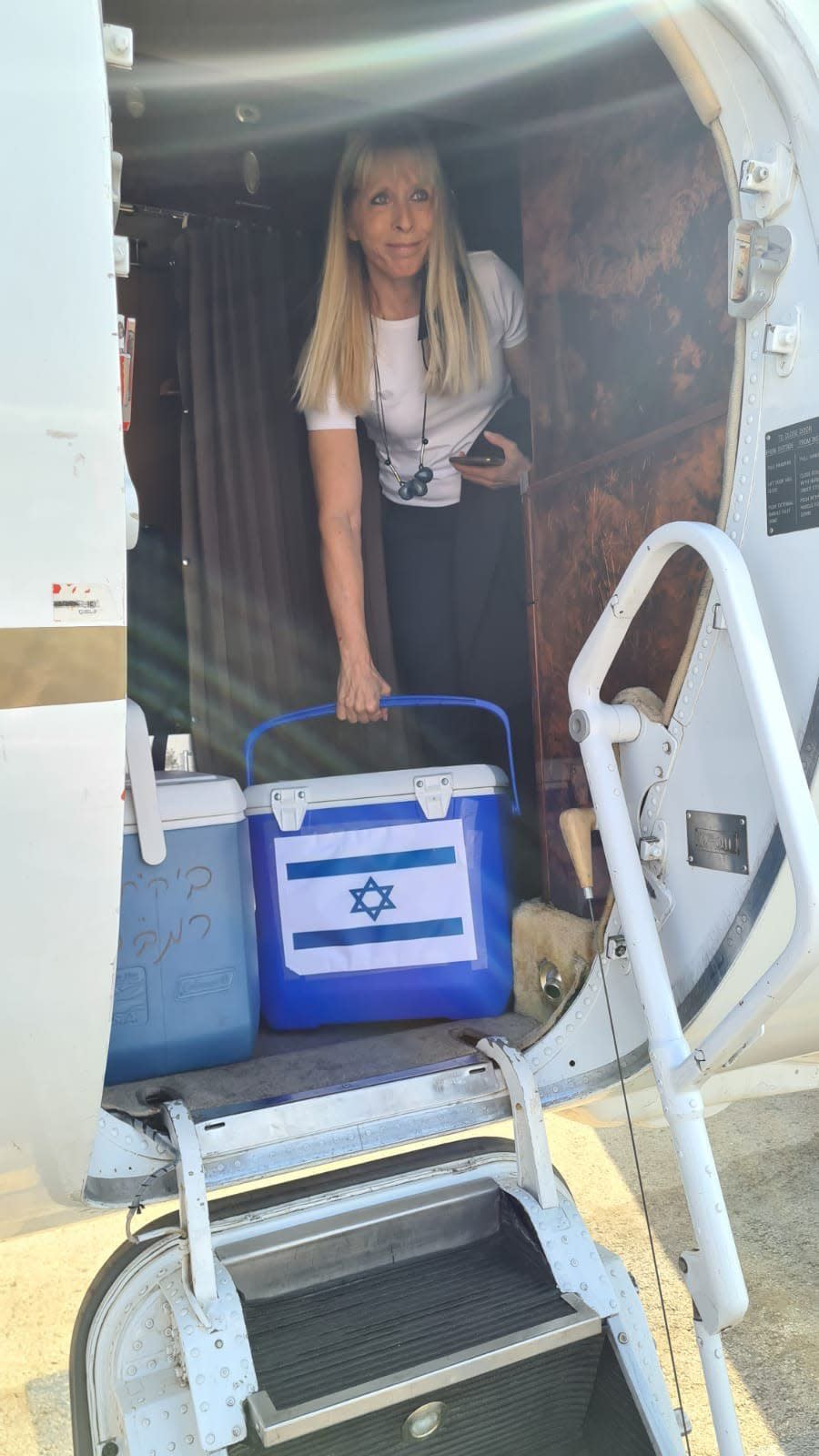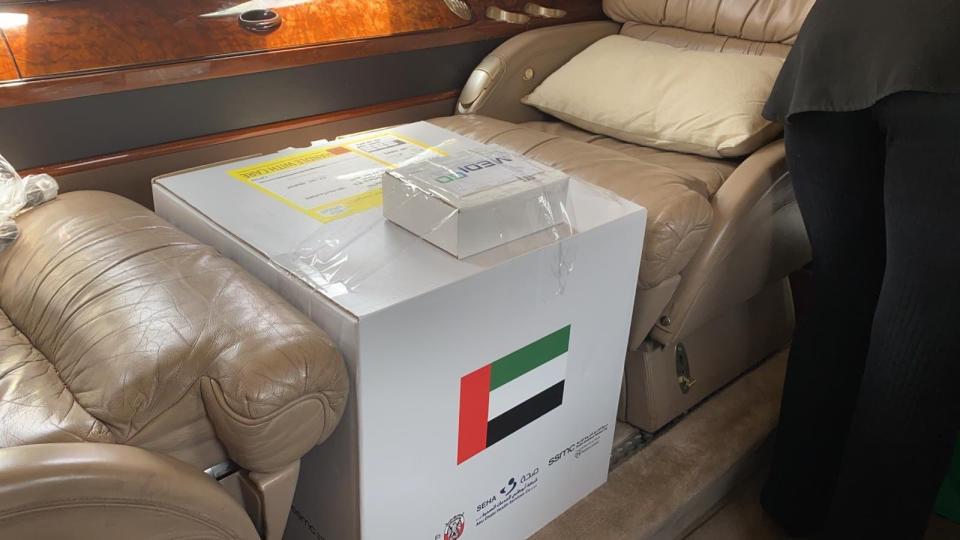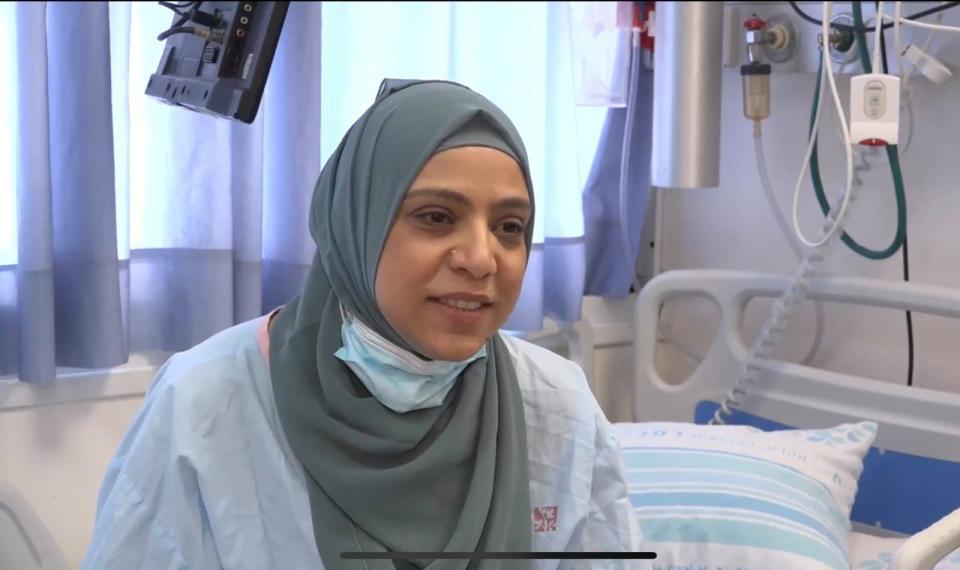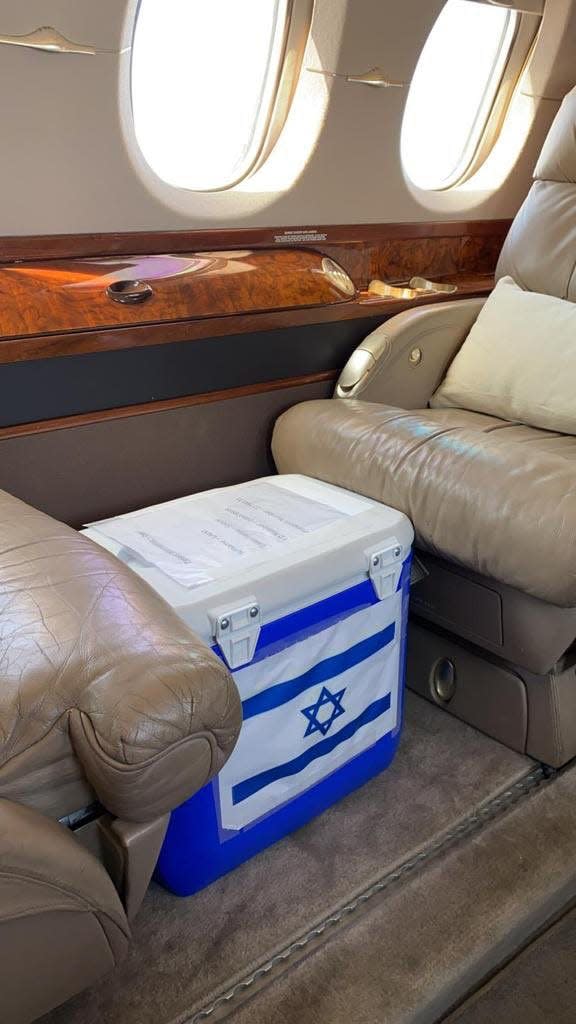How three Jewish and Arab families swapped kidneys, saved their mothers and made history
Tamar Ashkenazi was finally airborne. She had been up before dawn but was feeling more excited than exhausted as she glanced down from 40,000 feet at the sprawling desert kingdom of Saudi Arabia.
The private jet had taken off on time from Tel Aviv’s airport at 8:30 a.m. and was now winging its way east at 500 mph to a private airport in the United Arab Emirates.
Other than the crew, two things accompanied Ashkenazi, managing director of the Israel National Transplant Center: the powerful thrum of the Hawker 800XP’s engines and a large cooler with an Israeli flag taped to its side.
Inside rested a recently removed kidney that would soon make history.
Most kidneys are transplanted into patients from either a person who died or a close living relative. But this ice-packed organ was donated by a living Jewish daughter to save the life of an ailing Arab mother she did not know.
I returned to synagogue for the Jewish High Holidays. It felt like going home.
That surgery would be one of six within a carefully coordinated 18-hour time frame that would save three lives and hinge on the love of two daughters – hailing from countries with decades of built-in antipathy – for their mothers.
“What I felt in that moment on the plane was this transplant opportunity was a bridge between hearts, between two countries that had been enemies,” Ashkenazi tells USA TODAY, which was granted exclusive access to those involved in the historic exchange. “We all knew that this was special.”
At a time when the world seems rife with division and discord, what happened on July 28 reminds how mutual survival often depends on shared humanity triumphing over historical differences.

In this case, with the assistance of organ transplant experts in the United States, Israel and the United Arab Emirates, three pairs of kidney donors and recipients in Israel and the UAE saved each other in a series of choreographed, pay-it-forward surgeries known as a cyclic exchange.
While organ exchanges and cycles are not uncommon within countries, the procedure is far more difficult and rare between nations. Different time zones, national laws, divergent levels of medical expertise and facilities, the time-sensitive nature of transplants, and the vexing issue of black-market organ sales all conspire to keep international exchanges complex.
Timeline of conflict: Why the 2021 Israeli-Palestinian fighting is among the most brutal in years
Just consider the logistics involved in the UAE-Israel exchange. A UAE daughter who was not a match for her mother volunteered to give her kidney to a stranger. An Israeli Arab woman was a match for that kidney, so her husband agreed to donate his kidney to save an Israeli Jewish mother – whose daughter in turn gave her kidney to the sick mother in UAE.
“The reason we are excited about this is simply because the bigger the pool, the more likely you are to find matches,” says Dr. Michael Rees, a surgeon and founder of the Alliance for Paired Kidney Donation, a Toledo, Ohio-based nonprofit instrumental in making this politically groundbreaking kidney transplant chain a reality.
Humans need only one of two kidneys to live, so the organization works with donors who are willing to give a kidney to an unknown recipient to ultimately benefit their own loved one.

Rees was in the operating room in Abu Dhabi, one of seven UAE emirates including the internationally known hub of Dubai, when the kidney flown in from Tel Aviv was placed in the UAE mother. The powerful memory lingers.
“I watched the surgeon release the clamps, and the Israeli Jewish kidney came back to life with the blood of the UAE patient,” Rees says. “I’ve been around, but really I’m still just a kid from Flint, Michigan. And I can tell you this was a real moment for me.”
The real story of Morgan Wallen's $500K pledge to Black groups: How the money got distributed
37 million Americans have chronic kidney disease
Rees and his colleagues around the world are driven by both altruism and pragmatism.
Chronic kidney disease affects roughly 10% of the world’s population, although about 15% of Americans, or 37 million people, suffer because of the rise in causal conditions such as hypertension and diabetes, according to the Centers for Disease Control and Prevention.
Dialysis is the most common treatment for kidney failure, which for patients is inconvenient and uncomfortable. It is also expensive. On average, a year of dialysis costs about $100,000 – about the same as a kidney transplant, which frees patients from machines and doubles life expectancy, Rees says.
The disease also disproportionately hits people of color, research shows. Compared with whites, Black people are 3.5 times more likely to have kidney failure, and Latinos and Native Americans are 1.5 times more likely.
“Until we are 3D printing human organs, the answer is more living donations,” says Dorry Segev, professor of transplant surgery at Johns Hopkins University in Baltimore.
While the U.S. has a robust transplant program involving deceased donors, there still aren't enough kidneys available for those in need, Segev says.
That's partly because while relatives often offer to donate to their loved one, biological factors such as incompatible blood type or antibodies that would result in organ rejection mean intrafamily donations cannot be done in more than 30% of cases.
Women have a particularly tough time with donations from family members. During pregnancy, a woman's body can detect the foreign proteins from the father and create antibodies – which the baby is protected against. But should the mother need a transplant later in life, those same antibodies often will work to kill a kidney from a child or husband.
Two co-workers. Two husbands in trouble. One conversation that changed everything.

Segev says this medical success story has the chance to open new channels of communication. “Here people not on the same side of the aisle politically or historically were brought together by their love of their family members,” he says. “May it happen more.”
Those communications, however, remain politically sensitive. When asked for comment, officials in the UAE focused less on the partnership with Israel and more on a general need for international cooperation.
“We are pleased that our innovative partnership with the Alliance for Paired Kidney Donation has allowed us to help our patients,” says Dr. Ali Al Obaidli, chairman of the UAE National Transplant Committee. He added that a collaborative spirit between countries can be used to “close the gap” for those in need of kidneys.
The UAE donor daughter and recipient mother asked not to be identified by name or religion. Conversations with those involved in the cyclic exchange say kidneys donated outside the UAE generate negative reactions among some Emiratis.
But the donor daughter did answer an emailed question with candor. “The situation we were in is a medical one and is all about saving lives,” she wrote. “It did not matter to me at all from which gender, ethnicity, religion or nationality the parties in this exchange would be.”
More than 1,000 miles to the west, Shani Markowitz Lalkin, 39, whose kidney saved the life of her UAE contemporary’s mother, says she would like to one day meet her counterpart.
Here's how to help: Want to donate or volunteer to assist Haitian refugees?

“I wonder about the other mother and daughter, maybe as much as they wonder about me,” Lalkin says. “I’m a Jew, they are not. We have different cultures. But maybe one day we can talk. I don’t feel like I did anything historic. I just did something to help my mother, like she did.”
Laklin’s mother, Asiag Yadidi Yafit, 61, was told two years ago that she was in kidney failure and needed to start dialysis. Waiting lists for kidneys stretch years in most countries. Yafit didn’t think she would make it.
“My daughter did a noble deed, saving my life and the life of another mother in the UAE,” she says. “I never thought of my donor being a Muslim or Jew, because I believe all human beings are equal. I just hope people take example from my daughter. If they give while living, it will bring so much hope to those waiting for kidneys.”
Not all Muslims practice Islam the same: No, I don't eat pork, but yes, I'd love a glass (or five) of wine
A historic thaw in Arab-Israeli relations leads to lives saved
The ultimately successful outcome of the procedure relied not only on delicate diplomacy between officials and doctors in Israel and the Persian Gulf region but also on an innovative game-theory algorithm created by a Nobel laureate that helped identify recipients who stood the best chance of benefiting from the kidney exchange.
This all unfolded against the backdrop of a delicate thaw in relations between the Arab country and Jewish state as a result of the Abraham Accords, a 2020 peace agreement that normalized relations between Israel, the UAE, Morocco, Bahrain and Sudan.
But last spring, violence flared again between Israel and the Palestinian group Hamas, resulting in dozens of deaths from bombs and airstrikes. Although the political tensions interrupted the steady flow of conversations, the desire remained high on both sides to make the exchange happen.
"Basically, we all wish for peace," says Israeli transplant surgeon Eytan Mor.
What are we so afraid of? In 2021, sex and disability are still taboo

Rees says that although the turmoil caused official talk to "stop dead," he and others continued to work behind the scenes to keep officials and doctors in the UAE and Israel on track. “In late May, there was a cease-fire. There was a lot of hand-wringing, but by mid-June people were talking again. Everyone said, ‘We still want to do this.’ ”
This unique transplant chain began when the 60-something mother in the UAE found out in fall 2020 that she had kidney failure and would soon need to start dialysis or find a new kidney.
Because her family members were not matches, Rees and his Alliance for Paired Kidney Donation team got to work finding a match, which also involved seeing where her daughter’s donor kidney might go.
The first step was to plug all the relevant medical details into an algorithm created by Stanford University economics professor Al Roth, who won a Nobel Prize in 2012 for using game theory to improve complex matching efforts ranging from pairing students with colleges to patients with donors.
Also crucial to the process was Roth's Israeli colleague Itai Ashlagi, who had developed software that could instantly mine his native country’s kidney database. While Israel had started to develop transplant relationships with Austria and the Czech Republic, he was excited about this new involvement with the UAE.
“Better to exchange kidneys than bombs,” says Roth, adding that using computers to search the world for medical solutions radically increases the chances of patients getting help. “Internal boundaries are artificial markers. Kidney disease doesn’t care about that.”
Much of our slang comes from the Black community: Not acknowledging that perpetuates racism
Two kidney-filled coolers, two flags, one mission
The software quickly found a match for the UAE donor’s kidney in Walaa Azaiza, who asked to be identified as an Israeli Arab mother of two in her 30s. She lives just east of Nazareth in the village of Daburiyya. Soon, the other players fell into place.
Azaiza’s similar-age husband, Khaled Ibrahem, would give his kidney to Shani Lalkin’s mother, while Lalkin’s kidney would travel to the UAE to change the fate of the original donor’s mother.

The sun wasn’t yet up on July 28 as Ibrahem’s surgery began at 3 a.m. By 6 a.m., his ice-packed kidney was couriered about 6 miles from Petah Tikva to Tel Aviv to be transplanted into Lalkin’s mother. At 5 a.m., Lalkin herself went in for surgery, and her organ was packaged and on the Hawker jet with Tamar Ashkenazi by 8 a.m.
A small but eager contingent, including Rees and UAE transplant official Al Obaidli, awaited the kidney at a private airport in Abu Dhabi.
With them was a cooler with the black, green, red and white UAE flag; inside was the daughter donor’s organ. The jet landed just after noon local time, and off stepped Ashkenazi with her own cooler bearing the blue and white Israeli flag featuring the Star of David. The handoff was quick but emotional.
“We all knew how historical this all was, but it wasn’t our place to say that, and we just kept our heads down working for the solution,” says Atul Agnihotri, chief growth officer for the Alliance for Paired Kidney Donation, who left his corporate role at Owens Corning after he himself required a lifesaving transplant.
The exchange of coolers capped months of constant conversations between him and the UAE and Israeli officials. Daily WhatsApp conversations would spill from respective offices to homes to foreign vacation destinations.
“There were a lot of issues to overcome, from hospital details to cultural differences, but you don’t get anywhere without at least starting to talk,” he says.
The international group of doctors and administrators knew they had almost reached their goal as Ashkenazi’s jet lifted off from the UAE with a kidney bound for Rambam Hospital in Haifa, where Walaa Azaiza was waiting .
For Azaiza, now two months into her new life, the political and logistical accomplishments that went into this groundbreaking kidney exchange are secondary to a far simpler joy.
Woman's grocery list for husband goes viral: How it sparked conversation about men's 'strategic incompetence'

“I had been waiting for more than five years and I had lost hope a kidney match would be found,” she said in a bedside interview with hospital officials just before her surgery. “I got desperate and tired.”
Of the beeping of the dialysis machine. Of the extreme limits on her diet. Of waiting to die.
Then, news of a donor from the UAE. Freedom. “I started to think: 'Wow, I will sleep a full night. I will be free and not limited in my time with my kids,'” she said.
And one more thing. Small, but at the same time mammoth. Azaiza used to love bananas, and her boys, 9 and 6, adore chocolate. Both were taboo for years as she carefully watched her diet and grudgingly hooked herself up to dialysis machines just to stay alive.
Now, thanks to an international cadre of people who were bound more by the Hippocratic oath than political differences, Azaiza has been able to realize a simple new dream: “To eat a banana and have many chocolates with my kids.”
Vaccine breakups: Is it fair to cut someone out of your life for not getting the shot?
This article originally appeared on USA TODAY: Jewish, Arab mothers united by life-saving, history-making kidney swap

